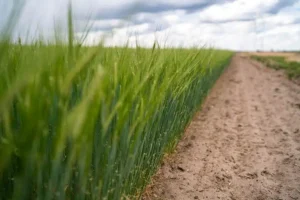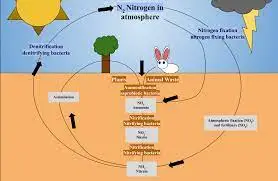No products in the cart.

Agronomy for Sustainable Development: Cultivating a Greener Future
Agronomy for sustainable development
- Definition and scope
- Importance of agronomy in sustainable development
- Key Principles of Sustainable Agronomy
- Conservation agriculture
- Integrated pest management
- Crop rotation and diversification
- Soil Health and Management
- Importance of soil in agronomy
- Sustainable soil management practices
- Soil conservation techniques
- Water Management in Agronomy
- Efficient irrigation methods
- Rainwater harvesting
- Water conservation strategies
- Crop Selection and Genetic Diversity
- Importance of genetic diversity
- Sustainable crop selection criteria
- Hybrid and indigenous crop varieties
- Agroforestry and Biodiversity
- Role of trees in agronomy
- Benefits of agroforestry
- Conservation of biodiversity in agriculture
- Climate Smart Agriculture
- Mitigation and adaptation strategies
- Resilient crop varieties
- Carbon sequestration methods
- Technology Integration in Sustainable Agronomy
- Precision farming techniques
- Use of drones and satellite imaging
- Digital agriculture tools
- Community Engagement and Empowerment
- Farmer cooperatives
- Knowledge sharing platforms
- Policy advocacy for sustainable agriculture
- Economic Viability of Sustainable Agronomy
- Cost-effective practices
- Market opportunities for sustainable produce
- Government incentives and subsidies
- Challenges and Barriers
- Lack of awareness
- Economic constraints
- Policy and regulatory hurdles
- Success Stories in Sustainable Agronomy
- Case studies of successful implementations
- Impact on livelihoods and environment
- Future Directions and Innovations
- Emerging trends in agronomy
- Potential breakthrough technologies
- Collaborative efforts for global sustainability
- Education and Training in Sustainable Agronomy
- Role of academic institutions
- Vocational training programs
- Knowledge dissemination channels
- Conclusion
- Recap of key points
- Call to action for promoting sustainable agronomy
Agronomy for Sustainable Development: Cultivating a Greener Future
Nowadays, it is critical to pursue sustainability in the field of modern agriculture. With the increasing environmental difficulties that our planet faces, the agriculture sector is essential to maintaining ecological balance and providing food security for future generations. This article explores the dynamic field of agronomy, highlighting its critical role in sustainable development and providing guidance on cutting-edge approaches and best practices.

Introduction to Agronomy
Agronomy, at its core, is the science and practice of soil management and crop production. It encompasses a diverse array of disciplines, including soil science, plant genetics, agroecology, and agricultural economics. In the context of sustainable development, agronomy seeks to optimize agricultural productivity while minimizing negative environmental impacts.
Key Principles of Sustainable Agronomy
Central to sustainable agronomy are principles such as conservation agriculture, which emphasizes minimal soil disturbance and permanent soil cover to enhance soil health and biodiversity. Integrated pest management (IPM) advocates for the use of natural predators and biological controls to manage pests effectively, reducing reliance on chemical pesticides. Additionally, crop rotation and diversification help mitigate soil erosion, nutrient depletion, and pest outbreaks, promoting resilient agroecosystems.
Soil Health and Management
Healthy soil is the foundation of sustainable agriculture, providing essential nutrients and ecosystem services to support plant growth. Sustainable soil management practices, such as organic farming, composting, and mulching, improve soil structure, fertility, and water retention capacity. Soil conservation techniques, including terracing, contour farming, and cover cropping, prevent erosion and nutrient runoff, safeguarding the integrity of arable land.
Water Management in Agronomy
Water scarcity poses a significant challenge to agricultural sustainability, necessitating efficient water management strategies. Precision irrigation techniques, such as drip irrigation and sprinkler systems, optimize water use efficiency and minimize wastage. Rainwater harvesting systems capture and store precipitation for agricultural use, reducing dependency on dwindling water resources. Furthermore, water conservation measures, such as soil moisture monitoring and water-saving technologies, help mitigate the impact of droughts and water shortages.
Crop Selection and Genetic Diversity
Promoting genetic diversity in crops is essential for resilience and adaptation to changing environmental conditions. Sustainable agronomy emphasizes the cultivation of diverse crop varieties, including traditional and indigenous species, to enhance genetic resilience and food security. Hybrid crops bred for disease resistance, drought tolerance, and high yield potential offer promising solutions to agricultural challenges while preserving genetic resources.
Agroforestry and Biodiversity
Agroforestry integrates trees and shrubs into agricultural landscapes, providing multiple benefits such as soil conservation, carbon sequestration, and biodiversity conservation. By diversifying farming systems with agroforestry practices, farmers can improve soil fertility, enhance microclimate regulation, and create habitat corridors for wildlife. Conservation of biodiversity in agriculture is vital for ecosystem resilience, pollination services, and the preservation of genetic resources.
Climate Smart Agriculture
Climate change poses unprecedented threats to global food security, necessitating adaptive strategies and resilient agricultural practices. Climate-smart agriculture encompasses a suite of approaches, including climate-resilient crop varieties, sustainable land management, and carbon farming techniques. By sequestering carbon in soils and vegetation, farmers can mitigate greenhouse gas emissions and contribute to climate change mitigation efforts.
Technology Integration in Sustainable Agronomy
Technological innovations are driving transformative changes in agronomy, revolutionizing farm management practices and decision-making processes. Precision farming technologies, such as GPS-guided machinery and remote sensing tools, enable farmers to optimize inputs, reduce waste, and increase yields. Drones and satellite imaging facilitate real-time monitoring of crops, pests, and soil conditions, empowering farmers to make data-driven decisions for sustainable agriculture.
Community Engagement and Empowerment
Sustainable agronomy requires active participation and collaboration among stakeholders, including farmers, researchers, policymakers, and civil society organizations. Farmer cooperatives promote collective action, resource sharing, and knowledge exchange, strengthening community resilience and livelihoods. Knowledge sharing platforms, extension services, and farmer field schools play a crucial role in disseminating best practices, empowering farmers with the skills and information needed to adopt sustainable agricultural technologies.
Economic Viability of Sustainable Agronomy
While sustainability is often associated with environmental stewardship, it is equally essential to consider the economic viability of agricultural practices. Sustainable agronomy offers cost-effective solutions that enhance productivity, reduce input costs, and increase profitability for farmers. Market opportunities for sustainably produced crops, such as organic and fair-trade products, provide incentives for adopting environmentally friendly practices. Government policies and incentives, including subsidies for sustainable agriculture and support for small-scale farmers, play a crucial role in promoting economic sustainability in agronomy.
Challenges and Barriers
Despite the benefits of sustainable agronomy, several challenges and barriers hinder its widespread adoption. These include lack of awareness and education among farmers, economic constraints, and policy and regulatory hurdles. Addressing these challenges requires concerted efforts from governments, research institutions, and agricultural stakeholders to promote sustainable practices, incentivize adoption, and overcome systemic barriers to change.
Success Stories in Sustainable Agronomy
Numerous success stories around the world demonstrate the transformative potential of sustainable agronomy in improving livelihoods and conserving natural resources. From smallholder farmers adopting agroecological practices in Sub-Saharan Africa to large-scale agroforestry initiatives in South America, sustainable agronomy initiatives are making a tangible difference in communities’ lives and landscapes. These success stories underscore the importance of local knowledge, adaptive management, and collaborative partnerships in achieving sustainable development goals.
Future Directions and Innovations
Looking ahead, the future of agronomy lies in embracing innovation, harnessing technology, and fostering collaboration to address evolving challenges and opportunities. Emerging trends such as regenerative agriculture, digital farming, and biotechnology hold promise for enhancing agricultural sustainability, resilience, and productivity. By embracing a holistic approach that integrates ecological, social, and economic dimensions, agronomy can contribute to building a more sustainable and resilient food system for future generations.
Education and Training in Sustainable Agronomy
Empowering the next generation of agricultural professionals with the knowledge and skills needed for sustainable agronomy is essential for advancing global sustainability goals. Academic institutions play a crucial role in offering interdisciplinary education and training programs that equip students with a deep understanding of agronomic principles, practical field experience, and critical thinking skills. Vocational training programs, farmer field schools, and extension services provide valuable opportunities for experiential learning and capacity building at the grassroots level.
Conclusion
In conclusion, agronomy holds immense potential as a catalyst for sustainable development, offering holistic solutions to pressing global challenges such as food insecurity, climate change, and environmental degradation. By embracing principles of sustainability, innovation, and community engagement, agronomy can pave the way for a greener, more resilient future for agriculture and society at large. As stewards of the land, it is incumbent upon us to adopt and promote practices that nurture the earth, support livelihoods, and safeguard the well-being of future generations.
Unique FAQs
- What is the role of agronomy in sustainable development? Agronomy plays a crucial role in sustainable development by optimizing agricultural productivity while minimizing negative environmental impacts, fostering ecological balance, and ensuring food security for future generations.
- How does sustainable agronomy differ from conventional agriculture? Sustainable agronomy emphasizes practices that promote soil health, biodiversity conservation, water management, and climate resilience, whereas conventional agriculture often relies on intensive chemical inputs and monoculture cropping systems that degrade natural resources and ecosystem services.
- What are some examples of sustainable agronomy practices? Examples include conservation agriculture, integrated pest management, crop rotation, agroforestry, precision farming, and climate-smart agriculture, all aimed at enhancing agricultural sustainability, resilience, and productivity.
- What are the economic benefits of sustainable agronomy? Sustainable agronomy offers cost-effective solutions that reduce input costs, increase yields, and enhance market opportunities for sustainably produced crops, providing economic incentives for farmers while promoting environmental stewardship.
- How can individuals contribute to sustainable agronomy? Individuals can support sustainable agronomy by making informed consumer choices, advocating for policies that promote sustainable agriculture, participating in community gardening initiatives, and supporting local farmers who adopt environmentally friendly practices.
Go and turn on towards organic farming to save future and thire save childs:
Elevate Plant Growth with Premium Bone Powder – Buy Now!
Organic Cow Dung Compost: Transform Your Garden Naturally
Premium Humic Acid for Healthy Plants | Enhance Soil & Boost Growth
Boost Plant Growth Naturally with Mustard Cake | Organic Fertilizer
Transform Your Garden with NPK Fertilizer | Boost Growth by 30%
Premium Perlite for Enhanced Gardening | Buy Now
Live Earthworms with Enhance Your Garden (soil health)
1 Neem Khali: Unveiling the Wonders of Nature
1Transform your garden with vermiwash-buy now
1 Premium quality Vermicompost [ केचुआ खाद ]
Follow us:


